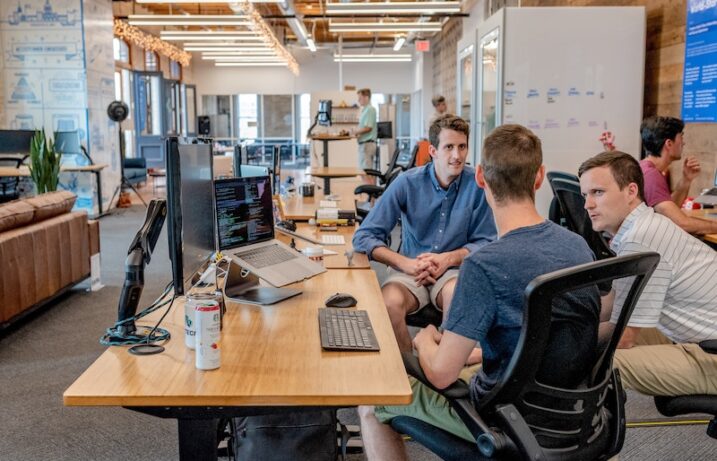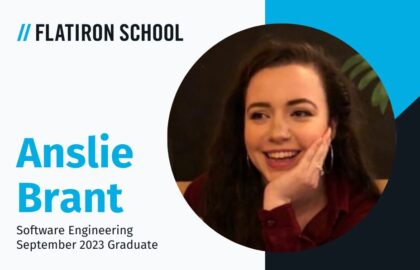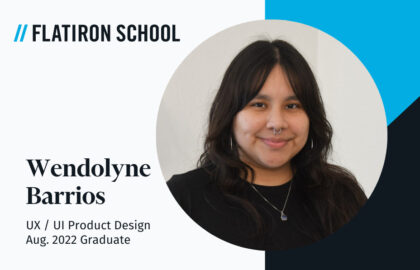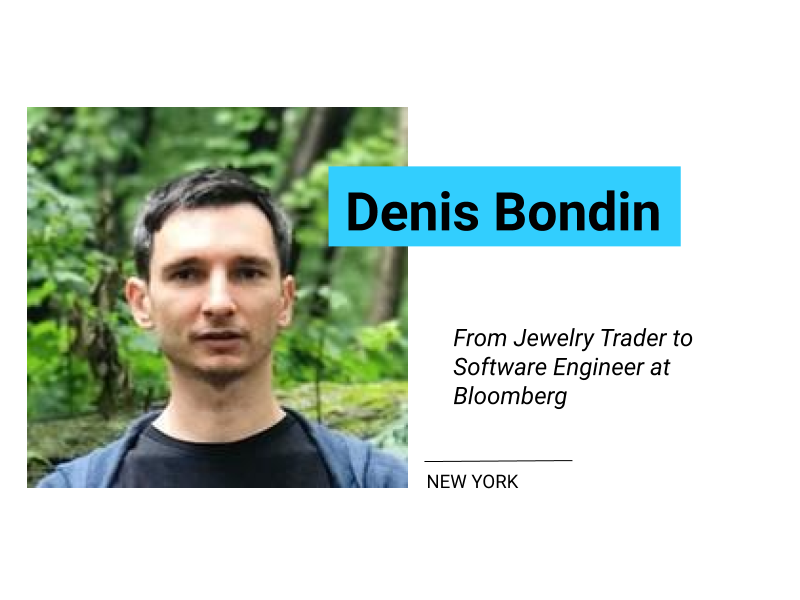
“If I were in the market again, I would spend more time on networking than on anything else.”
This month we feature a profile on Flatiron School graduate Denis Bondin. He started in the jewelry business, became a trader, discovered coding, and just landed his dream job at Bloomberg within five months of finishing Flatiron School! Denis shares his story here and what he learned along the way.
After an extensive career in the jewelry business, how did you discover code and what inspired you to enroll in Flatiron School?
My jewelry job was a temporary means of income before I became a trader. During my free time, I was speculating on stock and currency markets with the goal of trading full-time once I reached consistent profitability. I struggled for a few years and was about to give up but wanted to give it one more chance by trying algorithmic trading. I knew nothing about coding, so I started taking an online Computer Science course on edX. To my surprise, it was so much fun that I started spending more time on the course than on trading! By the end of the course, I knew that my next job would be in software engineering, and that I just needed more education. I had heard about bootcamps, and after some research, I chose Flatiron School’s Online Web Developer Program.
What's been the biggest surprise for you after starting the program?
How interesting and enjoyable the studying was. The course itself was not easy, some concepts took time to digest, and there were times that I got stuck. But the whole process was very different from my previous college experience. To me, the programming is like playing a puzzle game – you feel satisfaction when your code passes tests or when you find a bug that was causing some unexpected behavior. You don’t feel the pressure to learn, and you really want to go from one lesson to the next.
Another discovery was that you get an enormous amount of information in a short period of time. I was afraid that if I learned fast, I’d forget it fast. As it turns out, that wasn’t the case. I realized programming is not just about memorizing stuff but more about understanding the underlying principles, learning how to approach problems programmatically and, as Avi likes to say, learning how to learn.
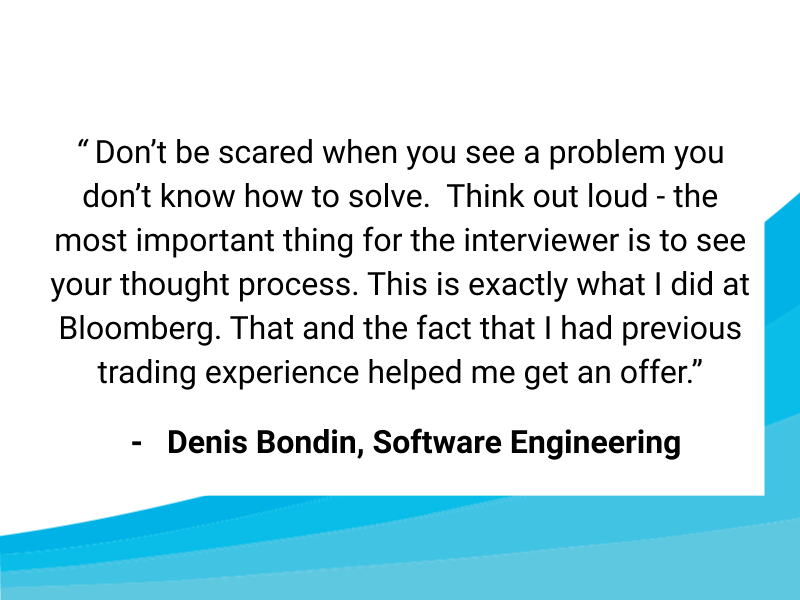
Although you hadn't been on job interviews for years, you found a part-time software developer role shortly after finishing Flatiron School, and within months received and accepted your dream job as a software engineer with Bloomberg. What did you learn during the 4+ months you were interviewing, and how do you think you were able to navigate the interview process to successfully obtain 2 offers and 2 jobs?
To be honest, my job search experience wasn’t as easy as I thought it would be. I received tons of rejections even though I made it to the last round at many companies. The way I see it now is, it’s all part of the process of ultimately receiving an offer. Don’t take a rejection personally, just move on. I know senior software engineers who didn’t get jobs they applied for, and I know bootcamp graduates who received offers quickly after their first interviews.
That doesn’t mean, however, that you should simply send as many applications as possible. New York is very competitive and there’s little chance you will get attention that way. Flatiron School’s Career Prep module provides lots of useful information, and the Business Development team works hard to get you leads not found anywhere else.
The first offer I received was from a very small startup that was looking for a part-time front-end developer with React/Redux experience. I wouldn’t say I was particularly brilliant during the technical interview but, as I was later told, I was hired because the owner felt I was more reliable and honest than other candidates.
I think the fact that I was already working for this startup helped me later land a full-time job at Bloomberg. One piece of advice I want to give to graduates is to make sure you learn about the interview process at the company you go to. I had read on Glassdoor.com that Bloomberg is heavy on algorithms and data structures. So when I passed the first technical phone screen and was asked to choose a date for the full-day on-site interview, I picked the one in two weeks so that I had more time to prepare.
Don’t be scared when you see a problem you don’t know how to solve. Think out loud – the most important thing for the interviewer is to see your thought process. This is exactly what I did at Bloomberg. That and the fact that I had previous trading experience helped me get an offer (Bloomberg’s main product is The Terminal – a software that provides real-time financial information for professional traders at banks and hedge funds). Now I actually feel lucky I was rejected by all the other companies, as this Bloomberg position combines my interests in both programming and finance and I’m starting there as an experienced professional!
How did your networking efforts go during your job search and what did you learn along the way?
At the beginning of my job search I went to one of the Silicon Alley events that happened at a small bar packed with people where everyone was looking for leads and selling their pitches. I didn’t like the experience and brushed this approach aside. It was only a few months later when I realized how wrong I was. Networking is probably one of the most important parts of your job search. If I was in the market again I would spend more time on networking than on anything else. The truth is that companies are not just hiring a specific skill-set but looking for skilled people with interesting personalities. When you are being interviewed there’s limited time for the manager or an engineer to learn who you are. Plus, as in my case, I’m usually stressed out during interviews and I know I don’t always act naturally. I’m sure if you start networking properly you have a greater chance to land your job sooner.
What advice do you have for Flatiron School students who are pivoting to entirely new careers from what they previously did?
Just go for it! If you have genuine interest in programming, you’ll be a success no matter what your previous experience is. You may get more interest from companies if you’re returning to an industry you have pre-Flatiron School experience in, than if you’re changing your industry to something totally new. But keep in mind that many companies like to hire people with diverse backgrounds. Think about what makes you stand out, and use it to your advantage.
What are you looking forward to in your new career?
Bloomberg uses a lot of proprietary technologies, so every new hire needs to go through their training program. Mine will start in Fall 2018, so I will have a chance to work with some of the team first. I will most likely be working with JavaScript as it fits my experience. After training, I can either go back to the same team or pick another one. I’m open to all possibilities, as the people I was interviewed by gave me a good impression about the work culture there.
Career Coach Maya Hormadaly on why it was great working with Denis:
“Denis approached his job search with great focus and resilience. He came close to getting jobs at least three times, and was rejected without explanation. Denis had a strict “two-day-sulk” time which enabled him to move forward and continue. He didn’t lose focus of the end goal. He remained determined and most of all, continued to improve his coding skills. He was a joy to work with, and was open to suggestion and recommendations. I am not surprised at all that he landed a fantastic position at Bloomberg!”
Interested in a coding career for yourself? Learn more about how to become a web developer, which programming languages you should learn, and how to pay for a coding bootcamp.
If you're ready, apply to our software engineering bootcamp.
